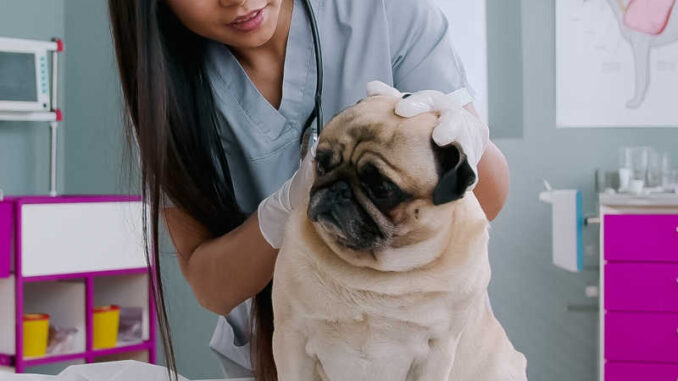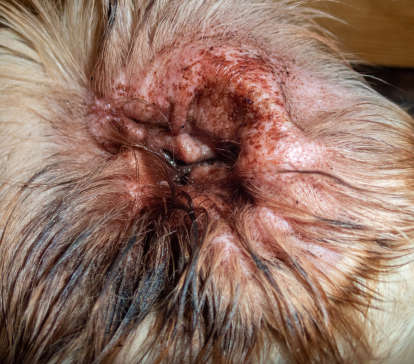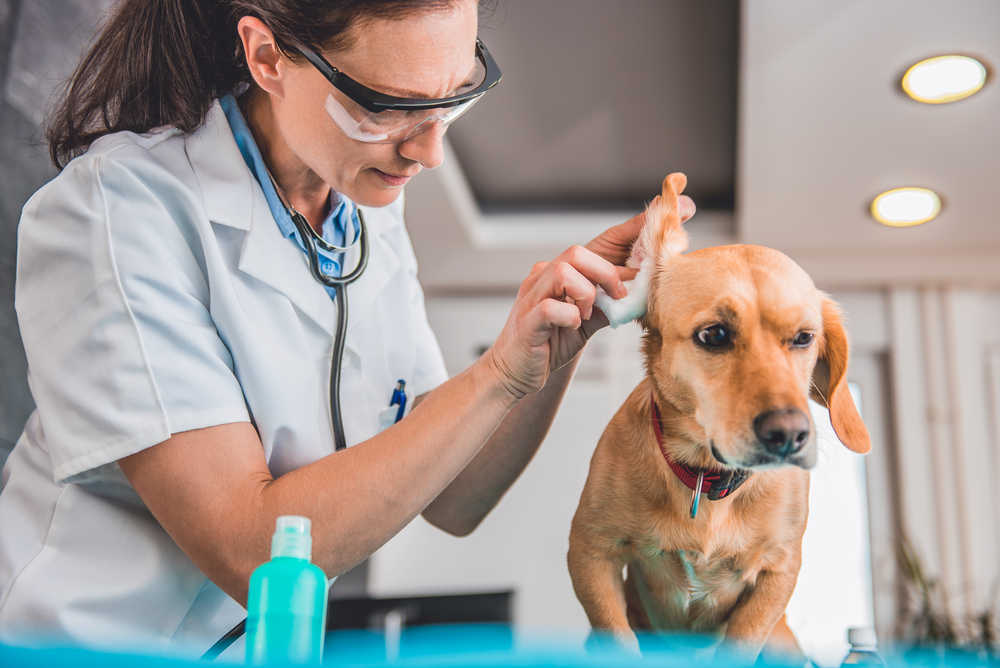
Did you know that a dog who has allergies is more prone to secondary conditions including anal gland disease and ear infections? This makes sense, as allergies mean a dog has both an over-active immune response and also a defective skin barrier which makes it more likely for bacteria and yeast to thrive.
A huge chunk of my day-to-day work is spent trying to manage those dogs with allergic skin disease, many of whom have ear infections. These infections often prove tough to both prevent and manage, especially when the dog is allergic to things they encounter every day (like dust mites and pollen).
The link between allergies and ear infections
We know that allergies frequently cause ear infections in our dogs . We also need to consider parasites, foreign bodies and ear tumors((Otology in the dog and cat, Angell Medical center)).
From my clinical experience, I’m always suspicious of allergies when a dog presents to me with an ear infection. Indeed, allergic otitis is the most common ear disease seen in pet dogs and is the culprit in about 3 in 4 cases((Allergic otitis externa in the dog. The Veterinary Nurse))1.
Dogs with atopic dermatitis have a poorly functioning skin barrier which allows allergens and pathogens to enter and does not lock in moisture as it should. An allergy typically first causes inflammation and itchiness. As your dog scratches and rubs, bacteria and yeast enter the broken skin.
Prevention of ear infections for dogs with allergies: What you can do at home
From home, there are plenty of things we can do to help. Possibly the most important thing is recognising signs of an early infection so you can seek vet care early on, before the infection establishes itself.
Early signs can include:
- A red or inflamed ear canal
- Head shaking and ear scratcing
- A bad smell from the ear
- Excessive wax
- A dark debris within the ear
- Bleeding within the ear
- Whining
- Lethargy

Owners may also be advised to regularly clean their dog’s ears. This may be every 1 to 2 weeks, depending on the patient.
Of course, allergen avoidance is also key. This may mean a hydrolysed diet, or perhaps avoiding certain walking routes or keeping dust mites to a minimum within the house.
We must also be sure to diligently use any prescribed medicine (such as Apoquel or Corticosteroids) to treat allergic flare ups when they occur.
Veterinary prevention of ear infections for dogs with allergies
As a vet, my role is to determine why these ear infections are occurring and to manage them as best I can. This may include allergy testing and immunotherapy. It is not realistic to aim to prevent all future ear infections, but we hope for them to be infrequent and mild.
We try to identify infections early and to treat with the appropriate antibiotics, pain relief and anti inflammatories. We want to keep the dog comfortable, to ensure they are happy with owners cleaning their ears and applying drops.
How allergies cause ear infections in dogs
Whether a dog has environmental allergies, food allergies or both, this will predispose them to developing ear infections. Dogs with allergies will often itch a lot and may scratch, lick or chew at their skin excessively. They will also often have red and irritated skin (mainly affecting the head, armpits, groin, anus and paws). See the top spots for allergies to showup on WaggleMail.com
This behavior damages the already weakened skin barrier and allows for entrance of pathogens like yeast and bacteria. Also, allergies lead to increased ear wax production which creates a moist and humid environment within the ears; just where these micro-organisms love to grow.
For some patients with food allergies, they will also have occasional diarrhea or vomiting as well as signs like abdominal bloating and flatulence (passing gas).
How do I know if my dog’s ear infection is the result of an allergy?
The best way to determine the cause of the infection is to see your vet, who will assess your dog and look inside their ears with an otoscope. They may also swab the ear to check for parasites, pathogens and foreign bodies.
If your dog has other signs of allergic skin disease (like red skin, paw licking or frequent scratching) we will be suspicious allergies are the issue. Once we rule out other possible causes for the ear infection, we can assume that allergic skin disease is to blame.

Steps to clean your dog’s ears
Never underestimate the important of regular ear cleaning. Doing so can help prevent and manage infections and is a necessary part of dog care, particularly if a dog has known allergies and has had a previous ear infection.

Most dogs will need one person holding them still while the other cleans the ears. Always reward after with a high value treat!
Your vet or nurse will always be happy to demonstrate how to clean ears if you’re finding it tricky.
Go to our Ear infections page.
References:
- https://www.mspca.org/wp-content/uploads/2020/10/Otology-in-the-Dog-and-Cat_Klaus-Loft-DVM.pdf
- https://www.theveterinarynurse.com/review/article/allergic-otitis-externa-in-the-dog
- https://onlinelibrary.wiley.com/doi/abs/10.1111/j.1365-3164.2007.00619.x
- Aetiology of canine otitis externa, Saridomichelakis et al [↩]
Disclaimer: This website's content is not a substitute for veterinary care. Always consult with your veterinarian for healthcare decisions. Read More.


Be the first to comment